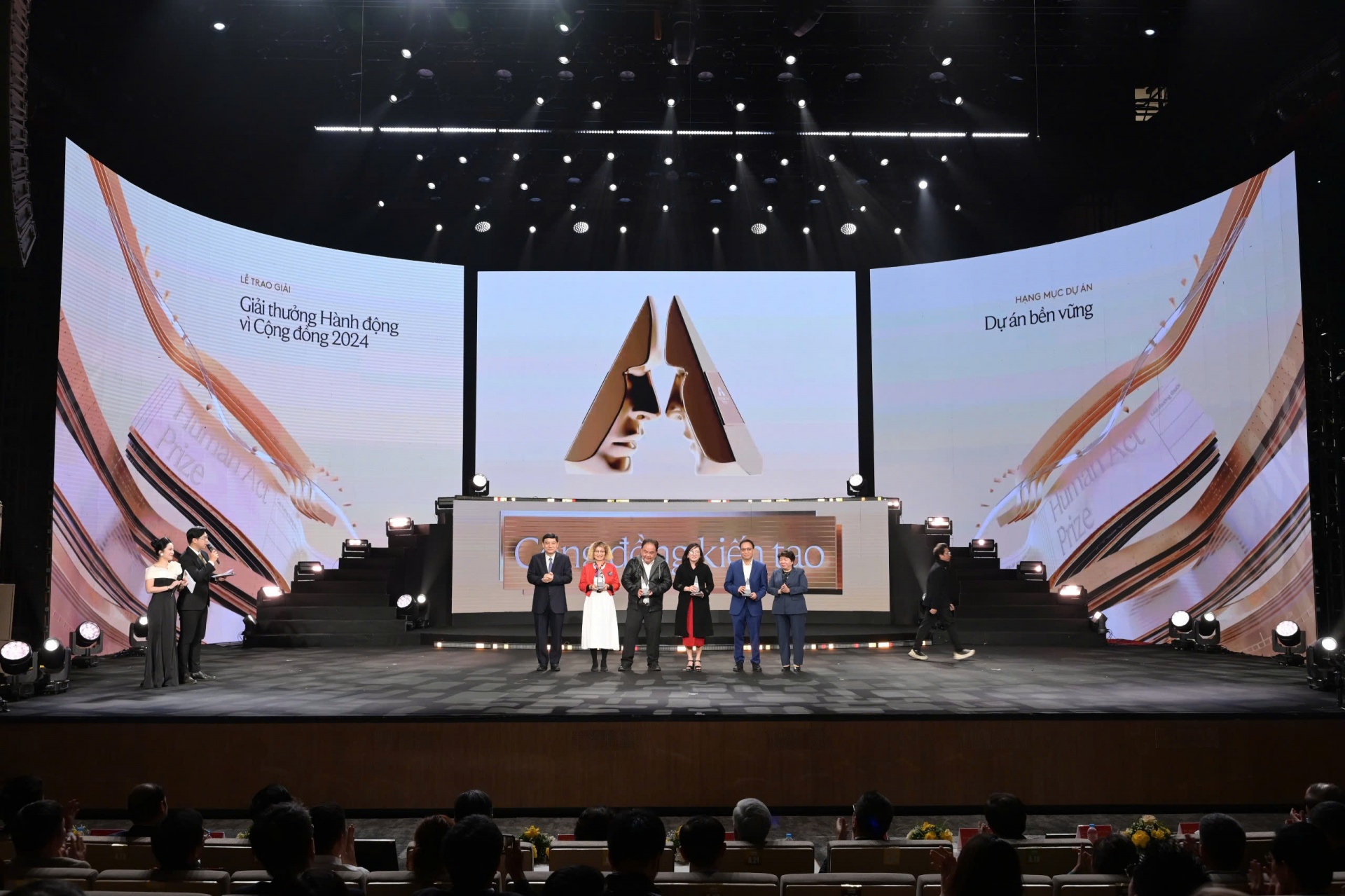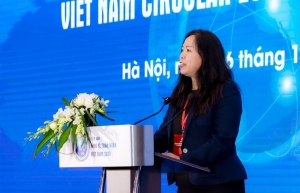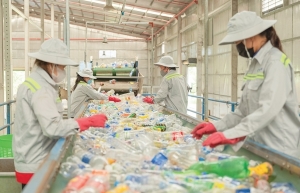Unilever Vietnam honoured with 2024 Human Act Prize
According to research from the Potsdam Institute for Climate Impact Research, climate change is projected to inflict damages equivalent to 17 per cent of the global GDP by 2050, with losses estimated at $38 trillion annually.
Against this backdrop, ESG (environmental, social, and governance) policies have emerged as a crucial framework for sustainable development in an era marked by globalisation and climate change. ESG sets standards to evaluate a business’s sustainability and responsibility. Vietnam is also joining global efforts to create a sustainable future, where the environment is a central pillar prioritised by the government, and is committed to achieving net-zero emissions by 2050.
 |
| Unilever wins the Sustainable Project Category at the 2024 Human Act Prize award ceremony. Photo: Unilever Vietnam |
In response to the urgent call for 'greening' the economy, enterprises like Unilever are redefining their operations to build a sustainable economy, reduce reliance on fossil fuels, and foster international collaboration in innovation.
Unilever Vietnam was honoured at the Human Act Prize Gala for Community Action in the 'Sustainability Project' category last December, with its initiative, 'Pioneering journey towards carbon neutrality in operations'. The annual award, organised under the direction of the People’s Newspaper, celebrates individuals and organisations that have made significant societal contributions through innovative, impactful, and sustainable initiatives.
 |
| A Unilever Vietnam representative receives the award in the Sustainable Project category. Photo: Unilever Vietnam |
According to the organisers’ report, Unilever’s scheme excelled in meeting three key criteria: improving production processes, integrating green technologies, and establishing systems to measure environmental impact. By implementing these innovations, Unilever significantly reduced CO2 emissions in its operations, while creating long-term value for both the economy and society.
Unilever's 'Towards a Circular Economy for Plastics Project' was honoured in the same category in 2023.
This year's award shows that innovation and sustainability are not just slogans but tangible, measurable, and impactful actions. Unilever's success is not just an isolated achievement, it is a sign that sustainability is increasingly becoming the new standard for global businesses.
Unilever is taking bold, comprehensive steps towards carbon neutrality, from production improvements to supply chain restructuring. In Vietnam, the company has achieved a major milestone by transitioning entirely to renewable energy in its manufacturing facilities. The intelligent energy management system at the Bac Ninh factory is a prime example, earning the LEED Green Building Certification, an international standard recognising environmentally friendly and energy-efficient buildings.
 |
| Le Thi Hong Nhi (right), vice president of Communications, Corporate Affairs, and Sustainability at Unilever Vietnam, at the event. Photo: Unilever Vietnam |
Furthermore, Unilever has invested heavily in green technology projects, such as installing solar power systems and using biofuels as alternatives. The company has introduced groundbreaking changes in its supply chain, including the use of biomass fuel recycled from materials like wood scraps, damaged pallets, and rice husks. This innovation has completely replaced fossil fuels in boilers, reducing CO2 emissions by nearly 10,000 tonnes annually since 2007.
The effectiveness of these strategies is reflected in impressive figures: 9,684 tonnes of CO2 eliminated annually from 2007 to 2022; 511kg of SOx emissions reduced each year through biomass fuel use; and 100 per cent elimination of carton waste in transporting packaging from Dynaplast. Unilever has also implemented and realised a circular economy model in managing waste, such as plastic waste, damaged pallets, and cardboard boxes–transforming waste into energy and fertilisers to support production activities.
Unilever’s efforts have reinforced its leadership role and inspired other businesses to integrate economic development with environmental protection. With the collaboration of the government and the business community, the goal of a net-zero Vietnam by 2050 is entirely within reach.
 | Unilever Vietnam embracing circular economic benefits With only one-third of plastic waste being recycled, Vietnam is losing nearly 70 per cent of the value of plastic materials, equivalent to nearly $2.2-2.9 billion a year, because of disposal into the environment. |
 | Unilever consistent in sustainability in Vietnam Unilever’s journey of more than 100 years of global development and nearly 30 years in the Vietnamese market has left impressive achievements in sustainable business, worthy of the position of top global sustainable development enterprise. |
 | Unilever Vietnam striving to implement sustainable EPR The active cooperation between Unilever and various recyclers and collectors regarding extended producer responsibility regulations has cemented its determination to promote the plastic economy and accelerate sustainable development. |
What the stars mean:
★ Poor ★ ★ Promising ★★★ Good ★★★★ Very good ★★★★★ Exceptional
Related Contents
Latest News
More News
- Trung Nam-Sideros River consortium wins bid for LNG venture (January 30, 2026 | 11:16)
- Vietnam moves towards market-based fuel management with E10 rollout (January 30, 2026 | 11:10)
- Envision Energy, REE Group partner on 128MW wind projects (January 30, 2026 | 10:58)
- Vingroup consults on carbon credits for electric vehicle charging network (January 28, 2026 | 11:04)
- Bac Ai Pumped Storage Hydropower Plant to enter peak construction phase (January 27, 2026 | 08:00)
- ASEAN could scale up sustainable aviation fuel by 2050 (January 24, 2026 | 10:19)
- 64,000 hectares of sea allocated for offshore wind surveys (January 22, 2026 | 20:23)
- EVN secures financing for Quang Trach II LNG power plant (January 17, 2026 | 15:55)
- PC1 teams up with DENZAI on regional wind projects (January 16, 2026 | 21:18)
- Innovation and ESG practices drive green transition in the digital era (January 16, 2026 | 16:51)

 Tag:
Tag:



















 Mobile Version
Mobile Version